Webinar recording and transcript – Initial questionnaire analysis and deadlines
12 October 2023 - Initial questionnaire analysis and deadlines webinar
With Sonya Chowdhury, Chris Ponting and Sian Leary.
This webinar updates on the study's progress, some preliminary findings from initial questionnaire analysis and includes a Q&A session.
Watch the recording:
Direct link: Watch the recording on YouTube
Listen to the audio:
Read the transcript:
[Sonya]
Hello everyone. Welcome to the DecodeME webinar. We've run a few of these webinars in the past and we've had lots of people watching, but today we've had 1,400 people sign up to join us in the Zoom room and watch and we will also have a number of people watching on Facebook live. So I'd like to say welcome to you all.
We will be recording this. You won't be on the screens. It's just myself, Sian and Chris that'll be on this screen, so anybody in the Zoom room won't be seen. The film will be available afterwards so people can watch on Youtube at your leisure. You can stop and start it, watch it bite size chunks, however you need and if you need to drop out because it's too much, then please that's absolutely fine. You can catch up when we make the recording available over the next few days.
But first of all, I just like to invite my colleagues, Sian and then Chris to introduce themselves.
[Sian]
Hello everyone, it's really great to see so many people joining this webinar and so many people in chat saying hi. My name is Sian Leary. I am a person with ME and have had ME for over a decade now. And I'm really pleased to be part of the DecodeME team. I'm on the patient and public involvement steering group and I'm also part of the cohort delivery team that has been tasked with setting up and delivering the processes that many of you will have been through yourselves to take part in DecodeME. So, I'll pass on to Chris to introduce himself.
[Chris]
Hi everyone, I'm Chris Ponting from the University of Edinburgh. I'm a human genetics researcher, so I study DNA and am absolutely delighted to be one of the investigators of the DecodeME project.
[Sonya]
Thank you both. You'll be hearing from Sian in the Q&A at the end and also from Chris in a little bit. So just to say a bit about asking questions. The Q&A is available. You can type in a question at any time. It'd be helpful, now we've all said hello, if you can keep it just for questions about the things we're covering in the webinar and about to DecodeME.
I know that having somebody like Chris and being able to ask questions is a real opportunity, but we can't comment on people's individual circumstances and we can't also comment on health questions or questions about broader research. So, I know people have got lots of questions, but we're just going to ask you to try and keep focused. We've had a huge amount of questions that have come in in advance as well and we will not get through all of them. We will try our best. Some of them are not quite related in the way that I've just described to DecodeME and so I'm afraid we, thank you for the questions, but we won't be able to pick those up.
And I may also group questions to together because that just makes it easier for us and means we can get through more questions.
We've also got Claire and Anne in the background, who are helping us with the tech and managing Facebook Live and posting questions from there, so please bear with us if we have any hiccups. I'm sure we won't, but we are trying to cover as much as possible, and make this as accessible as possible. So, I'd like to start by sharing the agenda.
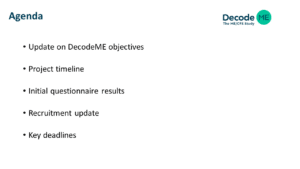
I will begin by updating you on the DecodeME objectives. We're going to tell you a little bit more about the project timeline. We're going to share some initial questionnaire results. Some of you will have seen these in our publication already, but we'll talk a little bit more about that.
We're going to give you an update on recruitment and we're going to remind you of the key deadlines.
So a little bit about the DecodeME objectives.
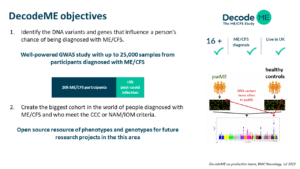
As some of you will be very aware, we're really undertaking this study to identify the DNA variants in genes that influence a person's chance of being diagnosed with ME or chronic fatigue syndrome.
And I'm just going to use the words ME because that's my preference and I know that's a lot of other people's preference too.
This is a genetic study, but actually it's much more than that because we have got tens of thousands of questionnaire responses.
So everybody that's completed a questionnaire is a huge part of this study and Chris is going to say more about that.
And then some people have contributed to the genetic part of the study. But together you have created the biggest database and resource of people with ME in the world and that is absolutely amazing.
We know to make it statistically powered, and that's kind of where we need to get to, to make this scientifically valid, we need to aim for 25,000 samples from people diagnosed with ME.
And that's broken down in 20,000 people, who've had a diagnosis of ME prior to covid 19 and 5,000 people who have been infected with COVID and subsequently had a diagnosis of ME.
And that's really challenging because we know there are lots of issues with people having ME like symptoms having a label of long COVID, but not being diagnosed with ME, and it's become quite confusing and quite challenging for everybody including health professionals.
As I said, we've created the biggest cohort or grouping in the world of people diagnosed with ME and specifically who meet the Canadian consensus criteria and the National Academy of Medicine or the IOM criteria. And we did a lot of work, with your help, to make sure that we both scientifically, and from a patient public involvement perspective, use criteria that were fitting for science, but also acceptable to our community. We are determined and we are working towards ensuring that this resource is available for other bona fide researchers.
We want other researchers to use the data that we're collecting, your data, to be able to look at the phenotypes and the genotypes for future research projects.
And that's really important. You know, you've given your valuable energy, your valuable time, your spit, and lots of information that is going to help not just DecodeME but other research as well in the future.
One of our public involvement colleagues, at a meeting I wasn't at so I'm probably not going to quote this properly, said that that actually, if you think about all the saliva that we've received already, it'll be like a sea of saliva. Which really isn't a very pleasant thought, unless you are scientists like Chris, who probably jumps up and down with excitement at the amount of data that holds.
But actually what that represents is the involvement of our community. All those people that have contributed data in the questionnaires.
And those people that have contributed saliva. And of course, all the people that helped us through patient public involvement or PPI. It has made the science better.
So every single person who's contributed in whatever way, thank you so much.
And just lastly to remind you, if you're thinking about taking part as we're going through, because you haven't done already. If you're over 16, you have a diagnosis of ME or CFS and you live in the UK, then please go to to DecodeME.org.uk and consider taking part. There's lots of information there.
And the last thing is the diagram in the bottom corner.
I had to check this with Chris, because I thought it's going to be much more complicated than my simple understanding. And he confirmed that that actually this is just a diagram demonstrating with you what we're hoping to do.
We want to plot the comparison between the samples that you are giving us with those from healthy controls or people that don't have ME/CFS and we're looking for the statistical differences between those 2 groups. And you've got an example of one of the graphs that, Chris and the team, the scientists, will be looking at.
And so, I'm now going to hand over to Chris, who's going to give you a bit more of that science insight.
Actually, I think I lied Chris, is this still me?
[Chris}
No, I will I carry on, I just need to unmute it myself. So, thank you Sonia for that and I want to thank everyone who have to date contributed their questionnaire responses and their DNA saliva samples.
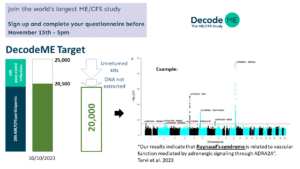
So we are at the stage for the DNA participants of having 20,500 people who have been asked to provide their saliva samples for their DNA.
And we need more, please, as many as possible, for the reasons that Sonia said, in order to make sure that we have the best chance possible of finding and discovering as much as possible about the genetic causes of ME.
So we hope to get towards 25,000 individuals who will be asked for their samples.
This isn't working. There we go. So, 25,000. And the problem is that inevitably there will be some people who won't return their kits and this is forever, for whatever reasons and including the royal mail losing them, we know that.
And so we have to aim for 25,000, so at the end of the day we will get to 20,000, so not just un-returned kits, but also there are some samples that essentially there isn't sufficient DNA to be extracted.
Taking account of those two factors that's why we believe that with 25,000 people, who are asked, at the end of the day will get to 20,000 and I hope that makes it clear so we're still quite a well, a distance away from our, targets, but the response has been phenomenal and I don't want to under emphasize that. It's just been extraordinary.
But I do well understand that the reason that the response has been extraordinary is that ME has such a strong unmet need.
And your desire for more science to be applied to this horrible condition. So this is, as Sonia said, just yet another example of what we hope for.
One of these Manhattan plots where we have the skyscrapers coming above the the cloud line and popping up above the red line, which would indicate a significant genetic association, a new discovery.
This one here isn't for ME clearly. This one is just something I've plucked off the internet.
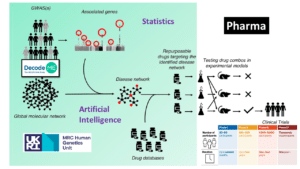
But the key thing is that with such genetic discoveries come very narrow focus on what is going wrong. And with a narrow focus on what is going wrong, will be born the next experiments that will discover not just what is going wrong, but what can be done to intervene and try and generate the next generation of effective therapies.
Or indeed to take a drug that already exists and redeploy it for ME as opposed to any other condition.
So that's what we hope for, is that we will do the genome wide association study.
We will find, let's hope for 7 or more of these associated discoveries. We will work out how these relate to one another.
What system is affected by these discoveries? Is it mitochondria? Is it the immune system or the neurological systems. Is it the vasculature?
We will partner with whomever can use their experience and their expertise to make discoveries in this area and we're doing this at the moment by working with Precision Life through their AI approaches.
We will compare with drug databases. We will look at what drugs could be repurposed and we'll do that as fast as we can.
There has been so much that's been going on behind the scenes in this project that is, you know, the most complicated project I've ever been involved with as an investigator.
And so it is just so exciting at the moment to get to this point in it, where we will within the next 6 months or more beginning to better understand this disease, we hope.
Beyond the end of DecodeME, we will be working as closely as we can with Pharma, with companies to ensure that they can make best use of the findings into clinical trials we hope. These will need new participants and this is again where hopefully some of you will come in, because the cohort that together we have put together will be of immense value to people doing tests and trials to try and work out what is most effective and for whom.
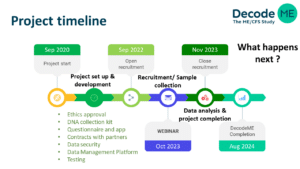
So the project timeline, of course we started in 2020 and we will finish next August, at the end of August next year.
There was a long lead in period for the project set up and development phase. There was so much to do, so many moving parts.
We launched for full recruitment a year ago, just over, and that was just a fantastic response from you all. So, so quickly.
And we have since then been collecting your samples, your questionnaires and this is where we are now in October, the 2023.
Now, we have to close recruitment. And we've given notice of that some weeks ago now. We have to close recruitment so that we can collect everyone’s sample, we can generate the data and we can analyse the data with everyone else's data before the end of the project.
So that's why we have to close recruitment next month.
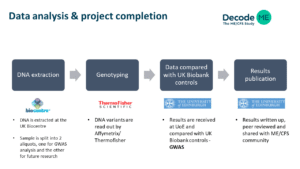
So, what happens next? For all those samples, they need to have their DNA extracted at UK Biocentre.
And we store one of the samples hopefully for future research. Then your DNA samples are sent for genotyping to ThermoFisher now in Denmark.
They need about 10 weeks to do so per batch and they send back the data.
And we will be comparing against general population controls from the UK in our genome-wide association studies in Edinburgh.
We will publish our results at one point only. When we are entirely convinced we've done the best possible job and it is as definitive as possible. So we're not going to drip, drip any findings because we need to give you what you deserve, which is the best possible science as soon as possible.
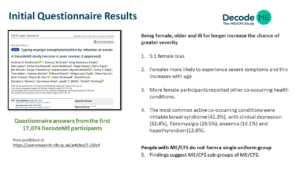
So just to come on to the initial questionnaire results, it is absolutely amazing that we have from you over a hundred thousand years of lived experience of people with ME.
Not just amazing, but it puts everything into perspective that we can bring together so much experience and in one publication try and distil it down into some trends.
I don't mean to imply that we have provided all of the trends and the evidence that there could ever be, but it was our attempt at bringing together some strands of evidence that best explain the major trends for people with ME in the United Kingdom.
This seemed to say that being female and older and ill for longer all increase the chance of greater severity unfortunately.
There is a massive female bias which clearly has been known for a very long time. It isn't a bias in our project only, it is also a diagnostic bias, as we know in the NHS. So a five to one bias is the reality.
Females are more likely to experience severe symptoms and this increases with age. And more females report other co-occurring health conditions, which are things such as irritable bowel syndrome, clinical depression, fibromyalgia, anaemia, and hypothyroidism.
So it is clear and it has been, I think, for a while, that people with ME do not form a single uniform group.
So at some point we can ask the question, well how do people differ? And we will in our genetics ask this question how does the genetic signal change if we separate people with an infectious onset versus those without? People who are female versus those that are male?
And this will be our first steps towards trying to stratify, in other words, to try and find different types of ME that potentially could be responsive to different drugs.
So I'll pass you back to Sonya to discuss the recruitment update.
[Sonya]
Thank you. So, we have had a phenomenal response as Chris has said. I mean, we are just blown away by your support.
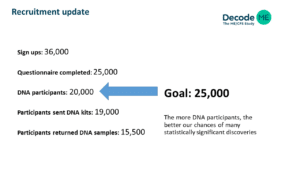
We've had 36,000 people have signed up. That's remarkable. We know that the questionnaire is long and detailed and it has to be to make the science better, but we've kept it as short as possible with the help of patient and public involvement colleagues, so that every single question in there is critical. And so far, 25,000 people have completed the questionnaire.
So if you're one of the people still completing the questionnaire, you do have time.
But do remember, if you haven't yet signed up, we're going to share the dates in the minute.
So you need to get a move on if you want to be part of this study.
Out of those 25,000 people who have completed the questionnaires, we have had, 20,000 people that have been invited to provide their spit.
And, as many of you will know that, we send you, I guess what we're calling a spit kit and you have to spit into a tube and post it back to us. One of our colleagues, Pippa, has done a brilliant little video that you can watch showing you how to do that and what you need to do to return it to us. As we mentioned earlier our goal is 25,000, so we still need more people to sign up. So far, we've sent 19,000 spit kits out.
There's a difference in those numbers because we need to send them in batches. So I know because I've seen on social media and some of the questions we get in to colleagues in the team, you don't always get your spit kit immediately and that's because we send them in batches, because that's the most cost-effective way to do it, and we have a company helping us do that. So we appreciate your patience and, if you don't receive your spit kit within 4 weeks, then please do contact the team, on the email address that you will have been given and on our website, so we can follow that up that but do give us a bit of time to get those out.
So far we've had 15,500 DNA spit kits samples returned. That's brilliant, but we need them back. So if you're one of these people, who has your spit kit sitting at home waiting to return, please do get that back to us. We know sometimes mishaps happen and, it feels a bit like the dog ate my homework here and people have to phone up and say ”oh there's been a bit of an issue and I need another spit kit”. But please do contact us.
Please do take care of your Spit Kit. They're really expensive. But we know that sometimes you might need a replacement or you have something go wrong and you just need to do it again. Please do contact us.
The team are amazing. They will get to your query as quickly as possible. Sometimes there's a bit of a delay because there are lots of queries, but do return those spit kits.
The more DNA participants we have the better our chance of getting statistically significant discoveries. And, if you remember, we said it's got to be statistically significant for it to have that scientific validity and rigor that is needed.
So here we've got some quotes from people. I'm not going to go through them all.
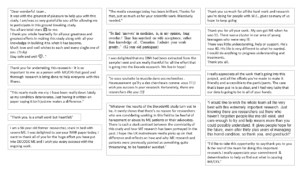
But I have to say many of us, in fact all of us on the team, have been really touched by the feedback you've given, coverage on social media, the help you've given to reach more people.
It's absolutely heart-warming to receive that and I can honestly say that what Chris said earlier about the challenges we face and this being the most difficult project to get going is absolutely true.
Everything from Amazon buying up all the boxes during the pandemic, a global pandemic, health difficulties, sickness, universities being shut, the issues with people working as part of our supplyr chain, just huge, huge issues that we've overcome.
And to receive your feedback like this makes it so worthwhile. The team has gone above and beyond and more than on many, many occasions to overcome the challenges that we've had and to make this study as good as it is because you, we, in the ME community to deserve this.
So thank you for all your lovely feedback.
And then lastly, as Chris moves us on to the last slide, just a reminder of the key deadlines.
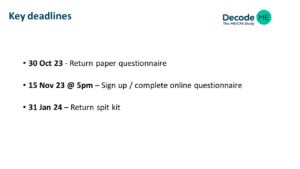
The 30 October, so that's only a few weeks away, is the closing date for you to return paper questionnaires and a reminder that Helen at the 25% group is available to support people who are more severely affected that don't have support around them to complete the questionnaire.
She's amazing. She does it in small chunks. Has put a lot of time and effort into supporting people.
So if you need that support, that is there. At 5 pm on the 15 November, you need to have signed up and completed your online questionnaire.
You've got a bit of time to do that, but you have to complete the questionnaire.
At 5pm we will be closing that. There will be no exceptions, because we have to have a cut-off point to allow us then to progress onto the next phase of this study.
And then the final date for you to remember is that by the 31 January. You have to have returned your spit kit. It has to have gone back in the post to us.
So just a reminder, if you're over 16, you live in the UK, you have a diagnosis of ME or CFS, you can participate now. You can help change this awful scientific gap of understanding that we have in in terms of this horrid disabling, just so many words I want to use about this, disease.
You can be part of history and help us change that. So please do take part now. So I'm now going to move to the question and answer part.
Questions
We've got just under half an hour for the questions and answers. I'm trying to manage a chat which has got questions in.
Over 50 questions that have come in by the Q&A function from panelists here and more questions coming in for Facebook Live.
So please do bear with me. We will try and get to as many questions as possible. I'm just going to kick off by saying that we've received a series of questions about whether the DecodeME results support or refute other scientists hypotheses, what they think might be going on., all their research. And as Chris said, we haven't yet undertaken a full analysis and therefore we're not able to comment.
We will only give comment when we have confidence in the scientific evidence base that we produce through this study. And we're not going to do that early because you deserve better.
And we're only going to do it when we are absolutely a hundred percent sure we've done as much as we can to determine that it's valid data.
And so, for all those questions we've had about other researchers, we're just not going to answer those now because you deserve us not to.
We've also received a few questions about whether Action for ME as a charity, or DecodeME, will collaborate with other researchers and some of you have suggested people. As Chris said, we will collaborate with anybody.
There's a limit to what we can do. We're a small team in a massive project with lots of challenges and lots still to do and so there is a challenge on our capacity, but where we can and where it furthers the science and, the credibility of our science within DecodeME, then we will do that.
And we will also, we're looking to collaborate with others and we are already, working with people who may access the samples.
From a charity's perspective and from the new genetic centre of excellence that we've set up with Chris and Edinburgh University.
In principle, yes. We're absolutely open to collaboration. We consider all approaches to us and we look at how it fits with our current work, our capacity, our resources.
And, which can be a challenge, and if it does, then we will certainly explore working together.
DecodeMe is our primary focus. We have to make sure that this is delivered. And we will always put that first.
So I'm going to go to some questions on the Q&A. Sian, I'm going to start off by bringing this one to you if that's okay. Do you have any further opportunities for involvement in PPI, (patient public involvement)? I'm a member of long covid support. I would like to get involved.
[Sian]
I think that there are quite a few groups that are very keen to have more people involved in them at the moment and
I would recommend emailing us as well at info@decodeme.co.uk
But I know that there is ongoing work with Action for ME, work with another organisation I'm involved in, the World ME Alliance, and work with a patient advisory group to the ME Research Collaborative here in the UK, all of which are kind of interested in keeping this going.
So, go have a google around the place, get in touch with a couple of charities that are working on this.
And there are absolutely more opportunities. There's also going to be more research happening in the future that needs to have patient and public involvement embedded in it, so that we can create the kind of success that we are seeing with DecodeME at this point in time.
Reach out and put yourself forward because it's an incredible role to undertake as well.
I think it kind of both gives you real purpose as an individual to be fighting for the disease that you live with and your own community.
And I think it's a really wonderful thing to do if you are able to.
[Sonya]
Right. And Chris is nodding away. We can honestly say PPI has made this study. The science is better because of the patient public involvement and, through the Genetics Centre of Excellence, we've got a fantastic Partnership Board, which is predominantly PPI members but there are other opportunities coming up.
So please do contact me at Action For ME or my colleague, Claire Dransfield, and we can respond to you. Chris, I'm gonna give you a couple of questions, possibly slightly unfair questions, but you know, we like to challenge you.
So I'm going to give you a couple. First of all, somebody's asked what our research has found so far. Chris has already outlined that and you can watch that back again. So Chris, do you envisage a cure becoming available in the future for ME? And is there any data or research on ME being genetic or hereditary?
[Chris]
I'll take the last thing first. There is already evidence that there is a genetic component. If you've got a first degree relative, second degree relative, third degree relative, who have ME then you yourself are more likely to have ME. Now that could be because you share the same sort of environment.
But not third degree relatives. Really? That's not persuasive to me. So that is more persuasive of the idea that there is a genetic component.
It doesn't explain everything clearly, but there is a part to ME that is genetic. So there is evidence already and it's why we were doing DecodeME, that was the first thing that we thought of and looked up.
Is DecodeME and its results going help people immediately? Now I wish it would does. I wish so.
I mean, if it were to help just one person, then that would be absolutely fantastic. However, the nature of research isn't this.
It isn't that we, in our fundamental genetic research, will immediately alight upon something that can go into the clinic and be demonstrated to be effective immediately.
I wish it were so, but it isn't. If I was really optimistic, I would say that we find something that implies that an existing drug would be effective.
And so someone could then do a clinical trial. Or trials. The most likely thing is that we will be highlighting areas of research that others should then focus on.
And by focusing on one or 2 areas of research, that should accelerate the findings eventually towards new therapies, because my view is that I mean research at the moment is quite diffuse and not channelling all its energies into one or two lines of enquiry.
And so, in broad response, my thoughts are that we will all get to where we need to get to, which is to help people overcome this just terrible disease, by looking at the evidence, seeing where it lands most and then pursuing those lines of inquiry. Rigorously and vigorously.
[Sonya]
Thank you, Chris.
There quite a few questions on the Q&A function on the Zoom room that relate to personal circumstances and also asking about our results.
As we said before, I'm sorry we're not going to be responding to personal questions and we're not going to produce the results until we're absolutely certain that they're at the level and validity that you deserve.
So I'm just gonna skip through those questions. There's a question here. I was turned down on my first application, because I don't have a doctor's diagnosis. Is there chance of applying again?
You have to have a diagnosis to be able to be part of this study.
There's another question that says, is long covid just a new term for ME? At the moment the science is playing catch up. We don't have a scientific evidence base. There's lots of research out there that's identifying different phenotypes and a range of research. We're just gathering all the data at the moment. One of my colleagues in the team is doing this.
It indicates that around 50% of people with long COVID have ME-like symptoms. And if you added those numbers together with the estimates of 250,000 people that that becomes 1.3 million. But the science has to drive that and we know people are having lots of difficulties with getting diagnoses.
So if anybody's struggling, some of the questions, the personal questions you're asking, and asking for advice, please contact the charities.
You can contact Action for ME, our information support and other services, health care services, are available and others services are offered by ME Association and others.
Chris, there are many, people with long COVID who've gone on to fit the criteria for an ME diagnosis.
Many have filled out the study questionnaire prior to the diagnosis. Can they somehow edit their original data to reflect this new diagnosis?
And therefore, potentially go on to DNA testing?
[Chris]
Please can you get in touch with your circumstances and we will address those on our case by case basis.
Can I just comment on what you were just saying, Sonya, about the results? Because I feel that some people may be disappointed that we are not talking about the results.
I just want to say that we only have around about a quarter of the data that has been delivered to us thus far. And I think it would be remiss of us to say anything about the results of a study if we only have in our hands today a quarter of the data.
[Sonya]
Thank you. I've just been made aware that there's a bit of an issue with the connection with Facebook Live. So apologies that those people who tried to join on Facebook live. I believe there's a post going out on social media apologising now as well. This video is available and so all of you watching afterward, our sincere apologies, it's just one of those tech things but hopefully you'll enjoy watching this back as a recording. Again, we've got lots of questions here around links with other research and questions about people's circumstances, which I'm sorry, as I said, I am going to, skip through.
There's comments about when the study is published when we get to that point. And how that's gonna happen and what it might show.
We don't know what it's going to show because we haven't done that analysis. But what I will say is when we publish, we will do that with our patient public involvement colleagues.
We will try our very hardest to make it as accessible as possible and to provide that in differing formats.
We absolutely will be running webinars and presenting those and using every opportunity that we can do.
There's a question here about why people from other countries are excluded. And whether the funding for the study is conditional upon the number of participants taking part.
So Chris, I'm going to, hand that one to you, please.
[Chris]
Thank you. So no, the funding was not conditional on the number of participants. So why is it that we're restricting ourselves to the United Kingdom?
Well, the reason is that we wanted to make sure that our money stretched to as many people with ME as possible.
So we are basically using all our money to look at the DNA of people with ME. And we are not using any of our money on the people from the general population who don't have ME.
For those people, who are our controls, we're using the data that already exists in the UK Biobank.
And the key thing there is that these are people who live in the UK. And because people from around the world have different genetic backgrounds, we have to match the people with ME, and their genetic background, to the control individuals, and their genetic backgrounds.
So if we were to allow people with ME from all around the world, we would probably be finding false associations and we can't allow that.
Now, there should be, and hopefully will be, further studies elsewhere. And when that happens we in DecodeME will be overjoyed to work with whomever really. To put the data together and find out what else can be found.
So, it's a matter of, pragmatism that we have to keep ourselves within the borders of the United Kingdom, but we have an aspiration to work across the world with as many people and as many genetic ancestries as we can.
[Sonya]
Thank you Chris, we have a load more questions here that I'm just gonna pick a couple out. If you filled in a questionnaire not being asked for DNA, are you now wanting some of us to send DNA.
If we if we're inviting you to send DNA we will contact you. So if you haven't had that contact, then no not at this stage, but your data is so invaluable.
That publication, the results Chris shared, was on the first 17,000 people and their data from the questionnaires.
So your data is valuable. We will publish it. We will share it. But we will contact you if we want your DNA.
If you still have to reach your target, how can I now be part of the DNA sampling? If you haven't signed up to take part, go to decodeme.org,uk and take part. When you complete the questionnaire, you may, or may not, be invited to provide DNA at that point, but you are still a huge part of our study.
Chris, I'm gonna ask you, a couple of questions here. And we've had quite a few questions, that link to this.
Why aren't you looking at those of us who are in remission, for want of a better term?
I've had ME for 20 years but no bad relapses for around 9 years. I've been told my samples are not wanted at this time.
So there's an invite there to say something about the criterion and elaborate on that. And then the other question was how will those have been unknowingly misdiagnosed affect the study?
[Chris]
So really quite important questions.
So I'd love to do a study on recovery. It is a really important thing for science to know.
Who recovers and perhaps why.
And to do that well, we would require a lot of people. So if people who are recovering have a different genetic reason for doing so, then we would never find it in this study, because there would be too few people. So I think that deserves its own study to be honest.
So that's about recovery and I know from reading the literature that the numbers are very low of people who recover.
Hugely regrettably. But I think that is an area of investigation that should be pursued.
Misdiagnosis. So this this does happen. It happens with every disease. It is sort of well known in medical circles.
Things like Parkinson's disease are 5 to 10% misdiagnosis rates. So has that stopped people in Parkinson's disease finding the genetic factors?
No.
What happens is that the more people that are enrolled into a study such as ourselves, such as for Parkinson's, the lesser the statistical effect is from other disorders.
Now, if people have been diagnosed with ME and they also have a co-occurring condition.
And that is relevant more to their symptoms than is ME. Then we also will be finding that in our analyses.
Because of the questionnaire responses, we will be able to ask questions about whether the genetic factors are better explained by a co-occurring condition than be explained by ME.
Okay.
You're muted, Sonya.
[Sonya]
Sorry. Sian, a question for you, around what can people do to help us reach our target number of participants?
[Sian]
So yeah, we still have a little way to go on this, although we have done, you know, really well so far, but we have got a last call campaign out at the moment and the deadline for you to fill in that survey online, the questionnaire online and sign up is the fifteenth of November. So we are asking people to do what they can on social media with friends and family, to support others to fill in that questionnaire if they can.
And there's still a really big role, I think, for everyone watching this, and everyone who's participated, to play in helping boost us and get us those final numbers so that we can make this science as robust as it possibly can be.
So do have a look at our website. We've got a load of resources available there that you can use to post, that you can use to share with friends and family, in local community centres even and other places.
It is really worth it for us to try and get those final numbers so that we can hopefully, yeah, work towards a much, much better understanding of ME.
[Sonya]
Thank you, Sian. And there's been a few posts about people saying how they've taken posters to their GP surgeries and those kinds of things.
So thank you everybody. You know the work you have done as part of this study. It's, your study, our study, is phenomenal.
Sian, I'm going to ask you this question. Chris, you may want to chip in. So, I was one who was initially not chosen for the DNA test then sometime later asked to take part.
What changed and how do we communicate this to other potential participants who were put off by this experience?
[Sian}
Yeah, so, that was a lot of big feelings around this and I think we tried really hard as a project to listen, to understand what was going on, to try and work out how we could do the best for the science of ME.
So, we did start off with a more restrictive criteria around who we could let into this study.
And I think we found along the way that that meant we were asking far fewer people for DNA than we maybe initially planned to.
That kind of led us, and the response we had from the community, to reassess how we could include more people and make the science as effective and strong as possible. I think we did that together in terms of understanding how we can do genetic analyses and Chris will be able to talk about this better than I can.
But genetic analyses that recognise the different conditions that people live with and the, you know, fact that the UK biobank has an amazing resource of people with many of the kind of comorbid conditions that people of ME live with that we can do some analyses against.
So it was, yeah, it was a process for us and, and we know it was a big thing for a lot of people with ME to go through, as well personally, and I think you know we want to say both thank you for your patience with us and for speaking to us and engaging with us. We want to do this project as a whole community.
And I think we've really shown that we can do that and that the ME community has an amazing ability to come together and work towards better things.
So we really appreciate all of your input to that process.
[Chris]
Yes, thank you for your patience and I've said this before but I just want to say it again.
Sorry, we didn't do what we should have done at the beginning. But we do hold up our hands and say sorry.
And then use the science to ensure that we maintain the standards that are absolutely required. But whilst in showing that as many people as possible can participate in that part of the study. That was a difficult time for us, but that doesn't matter.
What mattered was making sure that people could, and can, participate and then we can use that participation to the best of our ability as scientists.
And we also have a Scientific Advisory Board, a great collection of individuals who challenge us, you'll help hold us to account and help advise us.
So, you know, whenever we make those kinds of decisions, we do it in a really robust way and we get as many scientific minds, and people with lived experience, to help us with that.
I'm aware of time, so I'm going to rattle through a few questions. Somebody's asked whether animals will be tested?
We're not testing animals as part of this study. We've got people asking questions specifically about issues with their questionnaires and that kind of thing. If you have questions use the email address that you've been given, or via the website to contact the team, they'll be able to help you.
So, Chris I'm gonna ask you some questions around DNA, and it's not a stupid question, Chris gets lots of stupid questions from me! So how is the study going to be able to compare unhealthy DNA with healthy DNA.
I thought DNA was unique. So can you just, elaborate on that a bit and correct maybe a slight misunderstanding there.
[Chris]
No, it's a great question. Most of those basic questions are great questions. And the answer really is we're going to take everyone with ME, and we're going to look at your DNA, and then alongside we're going to look at the DNA of people from the general population.
And we're going to do that, not everywhere but in about a million places across everyone's chromosomes.
And then compare whether there is an inherited genetic variant that occurs more among people with ME than a does in the general population.
And we will do that a million times. Across all of these different places across the genome. And we're looking for where there is a strong signal, where there is one genetic variant, that is more frequent in ME than in the healthy controls.
And that should stick out like a sore thumb in this Manhattan plot. I hope that that's easy to understand.
[Sonya]
Thank you, Chris. Again, lots of questions coming in about people's personal circumstances, which I'm sorry, we are just not able to answer.
And Kondwani, who actually interviewed me, fairly recently is saying, how can I help?
So, and, I'll connect you with Kondwani afterwards and Claire can maybe take that forward.
Somebody's asked for the links to the questionnaire trends to be added here. We'll pop them on social media. But go to our website and they're on that linked in the blog, so you can access them there. There's few questions that are all worded slightly differently, but are about how we protect people's data and of course in this kind of world we live in that is a real concern.
So. Chris, are you or Sian, actually, would you be happy?
[Sian]
Don't mind. I mean, we've got a privacy policy that's all part of our big consent form at the beginning of the DecodeME questionnaire when you sign up on our website, or if you get a paper version, and that does really lay it out. We've tried really hard, in the creation of Public Involvement Steering group, to use kind of simple language and to make it as understandable as possible. But that really lays out how we will store all of your data and the safety procedures that we will go through and also in terms of kind of consenting to be part of future research studies to be recontacted and stuff like that. Again we go through all of the steps that we will take to make sure that you are kept safe as part of this study. And we recognise what big deal that is for people, especially in our kind of current world.
[Chris]
The data is held by the University of Edinburgh. They hold us to very high standards as they ought.
So there is a firewall which will stop, as you know, bad actors coming in and obtaining your data.
And then inside that, there is only a limited number of people who can access the data. And those people have to have training, I've done the training, we had to go through a lot of training so that people can then gain access.
So there are lots of sort of gatekeepers and walls and checks and balances.
[Sonya]
Thank you. I'm sorry if I look slightly distracted. I'm reading all the questions to try and cluster them
and get to as many as possible. People, again, commenting on their own personal circumstances.
I'm not going to ask those.
We got a question about where the funding for this study has come from.
It's jointly funded by the Medical Research Council and the National Institute for Health Research. So they have funded this. We are under strict parameters about what we can and can't research. Chris has outlined what it is we're looking at with this study.
So lots of questions about whether we'll be looking at other things. We're not in this study, because we have to deliver against the funding that we've got sent. And that's what we are going to deliver against.
People asking if you've got a diagnosis of CFS, chronic fatigue syndrome, can you participate? Yes, you can. You have to have a diagnosis of ME or CFS.
You can't participate from France, I'm afraid you need to be based in the UK. Some are asking about can we volunteer for trials later.
If you complete the questionnaire, you can consent to be contacted by other researchers. And there's all the data protection stuff that Sian and Chris have talked about around that.
So there is that option. We want to make it as easy as possible for more research in the future.
We've got one here from somebody you said, I think you said severe symptoms increase with age.
I've had ME for 20 years and I'm 76. Does it mean I will get worse as I get older?
Chris, go on then you say.
[Chris]
Yeah, all that we were reporting was the general trend. That does not necessarily mean that that is true for any one individual.
We're just looking at the general trends.
And we don't know what will happen with any individual. We know there are likely to be different subsets.
We're all individuals people who respond and react in different ways. So please don't anybody from the results that we've found be concerned in any way.
[Sonya]
They're just the trends as Chris said. Chris, what will happen if we don't get in enough participants to get a statistically significant result?
[Chris]
So we look at what has happened for other studies. With increasing numbers they don't find anything, they don't find anything, and then they get to a lift-off point. After the lift-off point, then the results start tumbling in. So where is our lift-off point in DecodeME?
Of course we don't know. But if our lift-off point was at about 14,000 people, then this is the critical period where we can get more people involved because there's basically more scientific bang for the buck.
So this is a critical moment for us to get as many people as possible, with consent, to participate in this study.
[Sonya]
Thank you. I'm really sorry. We have run out of, time. We have been, trying to answer as many questions as possible.
The DecodeME.org.uk website has lots of resources. Many of you are asking about what you can do to share, so please go to the website we've got lots of template emails, we've got, posters, we've got lots of resources there for social media you can use. Please help us. And thank you for sharing links in the QA for people.
I don't think everybody can see those, so we will make them available afterwards. I think Claire/Anne let's send an email out to participants if we can if that's possible. Please do help us reach as many people as we can.
Time is now ticking and it is of the essence and your help is absolutely critical. If you've got questions, you haven't received your spit kit, you're having problems with the questionnaire, please go to the email address that you will have received or is on our website.
The team will definitely, help you. And just a reminder, if you are over 16, live in the UK, have a diagnosis of ME or CFS, then you can take part.
You need to do it as soon as possible. So, we got through as many as we can, we'll have a look if there are certain themes that are coming up in the questions we didn't get to.
We will consider putting some more information on our Q&A. There's a whole lot of information in our FAQs on the website too.
So you may well find your answer in there. So the last thing I want to say is you've got three faces here.
Behind us is, what seems like an army, but actually is a very small team of hugely committed, dedicated people who are working incredibly hard.
And with a very high level, it's giving me goose pimples, with a very high level of passion.
Really doing everything they can to make our study the best it possibly can be. So I want to say a huge thank you to the team that's behind us. The three of us can only sit here today and talk about the study because of them and because of you. You know we may not get a cure immediately, we may not get treatments immediately. This is a huge starting point in science and we are creating history through this study. So thank you everybody. For everything you're doing. We really value it and we know your time and your energy is critical.
So thank you for being part of our study.